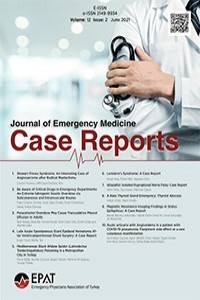Acil Serviste Zor Bir Tanı: Creutzfeldt-Jakob Hastalığı
Creutzfeldt-Jakob hastalığı, prion hastalıkları, demans, acil tıp (MeSH Database)
A Difficult Diagnosis in Emergency Department: Creutzfeldt–Jakob Disease
Creutzfeldt-Jakob Disease, prion diseases, dementia, emergency medicine,
___
- Puoti G, Bizzi A, Forloni G, Safar JG, Tagliavini F, Gambetti P. Sporadic human prion diseases: molecular insights and diagnosis. Lancet Neurol 2012; 11: 618-28. [CrossRef]
- Ladogana A, Puopolo M, Croes EA, Budka H, Jarius C, Collins S, et al. Mortality from Creutzfeldt-Jakob disease and related disorders in Europe, Australia, and Canada. Neurology 2005; 64: 1586-91. [CrossRef]
- Masters CL, Harris JO, Gajdusek DC, Gibbs CJ Jr, Bernoulli C, Asher DM. CreutzfeldtJakob disease: patterns of worldwide occurrence and the significance of familial and sporadic clustering. Ann Neurol 1979; 5: 177-88. [CrossRef]
- Haywood AM. Transmissible spongiform encephalopathies. N Engl J Med 1997; 337: 1821-8. [CrossRef]
- Heinemann U, Krasnianski A, Meissner B, Varges D, Kallenberg K, SchulzSchaeffer WJ, et al. Creutzfeldt-Jakob disease in Germany: a prospective 12-year surveillance. Brain 2007; 130: 1350-9. [CrossRef]
- Pocchiari M, Puopolo M, Croes EA, Budka H, Gelpi E, Collins S, et al. Predictors of survival in sporadic Creutzfeldt-Jakob disease and other human transmissible spongiform encephalopathies. Brain 2004; 127: 2348-59. [CrossRef]
- Clendenin J, Lall M. Creutzfeldt-Jacob Disease: An Emergency Department Presentation. American Journal of Emergency Medicine (2014). [CrossRef]
- Wientjens DP, Davanipour Z, Hofman A, Kondo K, Matthews WB, Will RG. Risk factors for Creutzfeldt-Jakob disease: a reanalysis of case-control studies. Neurology 1996; 46: 1287-91. [CrossRef]
- Collins S, Law MG, Fletcher A, Boyd A, Kaldor J, Masters CL. Surgical treatment and risk of sporadic Creutzfeldt-Jakob disease: a case-control study. Lancet 1999; 353: 693-7. [CrossRef]
- CDC's Diagnostic Criteria for Creutzfeldt-Jakob Disease (CJD), 2010 http://www.cdc.gov/ncidod/dvrd/cjd/diagnostic_criteria.html (Accessed on October 27, 2014).
- Başlangıç: 2010
- Yayıncı: Alpay Azap
Fitokontakt Dermatit: Olgu Sunumu
Elif DEĞİRMENCİ, Neşe DUMAN, Afife MAT, İşıl BAVUNOĞLU, İbrahim İKİZCELİ, Can AKTAŞ
İzole Süperior Mezenter Arter Diseksiyonu: Olgu Sunumu
Erdem AKSAY, Müge GÜLEN, Akkan AVCI, Muhammed Semih GEDİK, Duygu Selen CENGİZ
Bisikletten Düşme Sonrası İzole Künt Submandibular Gland Yaralanması
Salih EKİNCİ, Can AKTAŞ, Yoldaş DEMİRTAŞ, Abdülkerim ERTEN
Karbonmonoksit Zehirlenmesine Bağlı ST Segment Elevasyonlu Miyokard Enfarktüsü
Şeref Kerem ÇORBACIOĞLU, Gülşah ÇIKRIKÇI, Yunsur ÇEVİK
Protez Kapak Disfoksiyonuna Bağlı Dekompanse Kalp Yetersizliği Olgusu: Floro-skopi ile Hızlı Tanı
Ahmet Altuğ ÇİNÇİN, Beste ÖZBEN, Halil ATAŞ, Kürşat Tigen
Acil Serviste Zor Bir Tanı: Creutzfeldt-Jakob Hastalığı
Sertaç GÜLER, Halit AYTAR, Sinan GENÇ, Hayri RAMADAN
Hiperamonyeminin Nadir Bir Nedeni: Valproik Asit Zehirlenmesi
Duygu Selen CENGİZ, Muhammed Semih GEDİK, Müge GÜLEN, Erdem AKSAY, Hayri ÇINAR, Selen ACEHAN, Akkan AVCI
Protez Kapak Disfoksiyonuna Bağlı Dekompanse Kalp Yetersizliği Olgusu: Floro-skopi ile Hızlı Tanı
